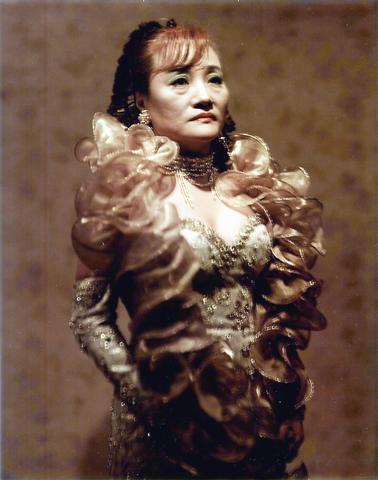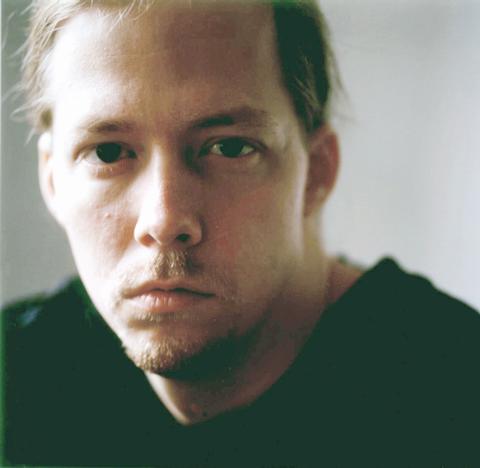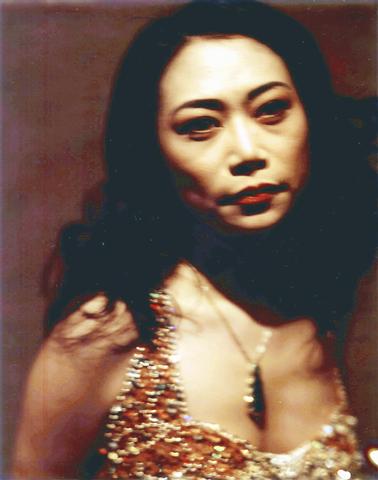Looking behind the curtain, seeing what isn't out on show, has both cachet and appeal. It is also, by definition, difficult and sometimes dangerous. Jeff Hargrove's second Taipei show, which brings his artist's eye to bear on the women who sing at Taipei's red packet cabarets, looks behind the curtain on a number of different levels, and is one of the most interesting photographic exhibitions with a local focus to be shown in some time. The last occasion was probably Chang Chien-chi's (
Jeff Hargrove, a Paris-based artist, has already done one show in Taipei. On that occasion, it was a series of portraits of Taiwanese artists. The stakes have gone up since then, and in turning his eye to the shadow world of Taipei's entertainment district, Hargrove has taken up a considerably tougher challenge. While most artists are hungry for publicity and relatively media savvy, the women who sing in Taipei's red packet cabarets are distinctly camera shy.

PHOTNS COURTESY OF JEFF HARGROVE
Most distinctively, in tackling this secret world, Hargrove totally rejected the hole-in-the-wall surreptitious photography that miniaturized technology has made possible. He does not want to steal images from a hostile environment. In opting to shoot with a 4x5 Deardoff, Hargrove cast aside any pretense of secrecy.

"We became friends," Hargrove said. "When we went in, everyone would come over an talk with us. We weren't like regular clients. They didn't feel they needed to put on their charms for us."
According to Serina Yeh (

The cabarets are seen alternatively as places where old men go for solace and as pits of iniquity in which singing serves only as a front for thinly disguised prostitution. In the complex social environment of the old city, the truth, as you might expect, is a good deal more complex.
"Many of the singers have very interesting, very difficult life stories," said Hargrove, who sees these women as shouldering enormous social pressures simply in order to carry on with their lives.
This situation was put in particular perspective by an article in the Chinese-language China Times last week that almost led to the cancellation of the show, which suggested that the singers of the red packet cabarets were simply "withered old women building fantasies for withered old men." While these are no Britney Spears or Christina Aguilera -- some may even be described as matronly -- Hargrove seeks a beauty that goes beyond skin deep. The strength, sorrow, pride and vulnerability that he has managed to capture in the portrait series can be very moving, and each time you look at them, new depths are revealed.
His style of work, the commitment of time and emotional energy that it requires, goes a long way to explaining what he has achieved. Regarding the many months of preparatory work, Yeh said that it was essential to establish the high level of trust that the photos required. "We hadn't thought [the preparatory period] would be so long," she said. "We had to judge when the time was right to raise the matter of taking the photos. We had to be very sensitive to their feelings."
But the investment, artistically speaking, has paid off handsomely, and Hargrove is well aware of the dividends he has reaped from "working together" with his subjects. "I wanted to show their most intimate feelings," he said.
To warm the singers up to the portrait shot, Hargrove had them sing the song they felt most deeply about -- many of these the common currency of Chinese love songs. "But for many of these women, there is a reason why they choose a certain song," Hargrove said. "I asked them to focus on this feeling when I took the shot."
This was a conscious exercise in self-revelation and Hargrove said that the most moving aspect of this project was the willingness of these women to bare their souls to the camera. "I asked them to sing, because this always raised the level of emotion," Hargrove said. And often, even with the presence of a large-format camera, the photo shoots become powerfully emotional moments for both the subject and the photographer.
The photos themselves, taken on 8x10 Polaroid stock, has a surreal quality that Hargrove said was the reason for giving up his favored black and white stock.
"These singers are a man's dream," he pointed out. "The red packet cabaret has a fantasy quality for the men who visit there." The visual quality of the photographs enhance this, with its over-saturated colors and eerily soft focus, that these women, in the eyes of most who see them, for all their possible imperfections, have an untouchable, ethereal, and eminently nostalgic quality.
His individual style didn't make him an instant hit with the singers he photographed, but a thoughtful approach to his photos reveals the rightness of the path he has chosen.
"Maybe it is not the best photo that has been taken of them," Hargrove said, emphasizing "in their eyes." Certainly, these are not photos of a conventional beauty. But ultimately, these are not conventional portraits. They tell stories of strength in the face of divorce, death, debt, and in the end, a world changed out of all recognition for a generation brought up to expect something completely different.
One aspect of the series that should not be ignored is that these women all work in the same environment -- in this case, the same red packet cabaret. Here lies the big difference with Hargrove's previous work. "The artists I photographed before, they were all very much individuals. These women are all part of a single place, so it is a communal portrait of a special world."
Whatever the negative stereotyping of the world these women live in, and the women themselves, the effect of Hargrove's images is a tonic against prejudice. Even in the trite words of a love song, the powerful spirit of womanhood comes through -- a will to live, a desire to survive, a care for the tawdry trappings that make us human. These portraits of the disenfranchised are powerful images of the complex social environment that is Taiwan.

This month the government ordered a one-year block of Xiaohongshu (小紅書) or Rednote, a Chinese social media platform with more than 3 million users in Taiwan. The government pointed to widespread fraud activity on the platform, along with cybersecurity failures. Officials said that they had reached out to the company and asked it to change. However, they received no response. The pro-China parties, the Chinese Nationalist Party (KMT) and Taiwan People’s Party (TPP), immediately swung into action, denouncing the ban as an attack on free speech. This “free speech” claim was then echoed by the People’s Republic of China (PRC),

Exceptions to the rule are sometimes revealing. For a brief few years, there was an emerging ideological split between the Democratic Progressive Party (DPP) and Chinese Nationalist Party (KMT) that appeared to be pushing the DPP in a direction that would be considered more liberal, and the KMT more conservative. In the previous column, “The KMT-DPP’s bureaucrat-led developmental state” (Dec. 11, page 12), we examined how Taiwan’s democratic system developed, and how both the two main parties largely accepted a similar consensus on how Taiwan should be run domestically and did not split along the left-right lines more familiar in

Specialty sandwiches loaded with the contents of an entire charcuterie board, overflowing with sauces, creams and all manner of creative add-ons, is perhaps one of the biggest global food trends of this year. From London to New York, lines form down the block for mortadella, burrata, pistachio and more stuffed between slices of fresh sourdough, rye or focaccia. To try the trend in Taipei, Munchies Mafia is for sure the spot — could this be the best sandwich in town? Carlos from Spain and Sergio from Mexico opened this spot just seven months ago. The two met working in the

Many people in Taiwan first learned about universal basic income (UBI) — the idea that the government should provide regular, no-strings-attached payments to each citizen — in 2019. While seeking the Democratic nomination for the 2020 US presidential election, Andrew Yang, a politician of Taiwanese descent, said that, if elected, he’d institute a UBI of US$1,000 per month to “get the economic boot off of people’s throats, allowing them to lift their heads up, breathe, and get excited for the future.” His campaign petered out, but the concept of UBI hasn’t gone away. Throughout the industrialized world, there are fears that